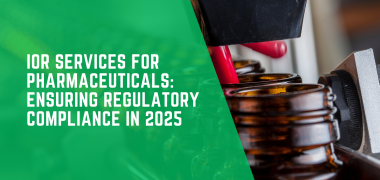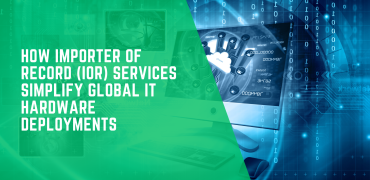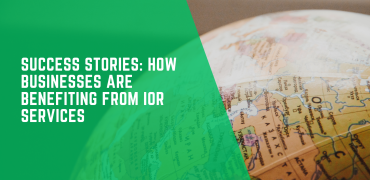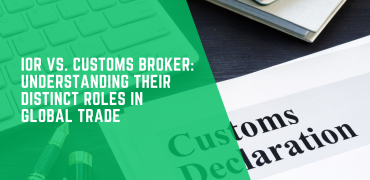In an era defined by rapid globalization and evolving regulatory landscapes, the pharmaceutical industry faces significant challenges in ensuring the seamless movement of products across borders. One of the most critical aspects of this process is compliance with international trade regulations. Enter Importer of Record (IOR) services—a vital solution for pharmaceutical companies navigating complex importation processes. In 2025, IOR services continue to be indispensable for ensuring regulatory compliance while optimizing global supply chains.
This blog explores the significance of IOR services for the pharmaceutical sector, emphasizing their role in maintaining compliance and overcoming operational hurdles in a demanding regulatory environment.
Understanding IOR Services in the Pharmaceutical Context
The Importer of Record (IOR) is a third-party entity designated to handle the legal and regulatory responsibilities associated with importing goods into a foreign country. These responsibilities include:
- Ensuring compliance with local regulations.
- Preparing and submitting necessary documentation.
- Managing duties, taxes, and customs clearance.
- Addressing any compliance audits or inquiries.
In the pharmaceutical sector, IOR services become even more critical due to stringent requirements for drug safety, storage, and transportation. A reliable IOR partner ensures that pharmaceuticals are imported efficiently without risking delays, penalties, or regulatory non-compliance.
Key Challenges Addressed by IOR Services
- Navigating Evolving Regulatory Frameworks
- Pharmaceutical regulations differ significantly across countries, and policies are frequently updated. For instance, standards like Good Manufacturing Practices (GMP) and import approvals vary widely, requiring meticulous attention to detail.
- In 2025, the emphasis on data integrity, product traceability, and sustainability has intensified, adding layers of complexity to compliance requirements.
- Ensuring Product Safety and Integrity
- Pharmaceuticals are highly sensitive to environmental factors such as temperature and humidity. Non-compliance with storage and transport standards can lead to compromised product efficacy.
- IOR services help enforce strict adherence to guidelines like the World Health Organization (WHO) recommendations for transporting medicinal products.
- Streamlining Documentation and Customs Clearance
- Importing pharmaceuticals necessitates exhaustive documentation, including certificates of origin, regulatory filings, and customs declarations.
- An experienced IOR provider ensures that all paperwork aligns with local and international standards, mitigating delays.
- Preventing Financial and Reputational Risks
- Non-compliance can result in severe penalties, legal repercussions, and brand damage.
- IOR providers help pharmaceutical companies avoid such pitfalls by maintaining rigorous compliance procedures.
Benefits of Partnering with IOR Service Providers
1. Expertise in Regulatory Compliance
An IOR provider’s in-depth knowledge of local laws ensures adherence to specific country requirements. This is particularly critical in the pharmaceutical sector, where rules concerning product labeling, clinical trials, and safety certifications are highly detailed.
2. Reduced Operational Complexity
By outsourcing IOR responsibilities, pharmaceutical companies can focus on core operations, such as research, development, and distribution, while leaving regulatory matters to specialists.
3. Global Reach and Consistency
IOR providers often have an established presence in multiple regions, allowing seamless navigation through diverse regulatory landscapes. This global footprint is essential for pharmaceutical companies engaged in multicountry clinical trials or market expansions.
4. Risk Mitigation
A well-versed IOR service ensures strict compliance, reducing the risk of penalties, product recalls, or shipment delays. Such mitigation strategies protect both financial stability and brand reputation.
5. Cost-Effective Operations
IOR services reduce the financial burden associated with setting up local entities in multiple countries. They handle duties, taxes, and compliance costs efficiently, enabling companies to allocate resources more strategically.
IOR Services in Action: A Pharmaceutical Case Study
Challenge
A multinational pharmaceutical company planned to introduce a novel vaccine to multiple countries in Southeast Asia. The company faced challenges related to diverse regulatory requirements, varying customs procedures, and the need for strict temperature-controlled logistics.
Solution
Partnering with an experienced IOR provider, the company:
- Obtained necessary import licenses and certifications.
- Ensured all documentation complied with each country’s regulations.
- Facilitated temperature-controlled shipments, adhering to WHO guidelines.
- Navigated complex customs clearance processes, ensuring timely delivery.
Outcome
The partnership allowed the vaccine rollout to proceed without regulatory or logistical setbacks, ensuring the product reached markets promptly and safely.
IOR Services and Technology Integration in 2025
Advancements in technology are revolutionizing IOR services, providing enhanced tools for compliance, tracking, and risk management. Key technological innovations include:
- Blockchain for Traceability
- Blockchain technology offers an immutable record of pharmaceutical products’ journey from origin to destination, ensuring complete transparency and compliance with traceability standards.
- Artificial Intelligence (AI) for Compliance
- AI-powered tools analyze complex regulations in real-time, providing actionable insights to IOR providers and pharmaceutical companies.
- IoT for Temperature Monitoring
- Internet of Things (IoT) devices monitor environmental conditions during transport, alerting stakeholders to any deviations that may compromise product integrity.
- Data Analytics for Decision-Making
- Advanced analytics enable IOR providers to optimize routes, predict delays, and ensure cost-effective operations.
Choosing the Right IOR Service Provider
When selecting an IOR partner, pharmaceutical companies should consider the following factors:
- Industry Expertise: Ensure the provider has proven experience in the pharmaceutical sector.
- Global Reach: A wide network is crucial for companies operating across multiple countries.
- Technological Capabilities: Advanced tools for compliance tracking, documentation, and product monitoring are indispensable.
- Reputation and References: Check client testimonials, case studies, and the provider’s track record for reliability.
- Custom Solutions: Look for providers willing to tailor their services to meet specific operational needs.
Conclusion
In 2025, the pharmaceutical industry operates in a complex and ever-changing regulatory environment. IOR services offer a reliable solution to ensure regulatory compliance, minimize risks, and facilitate the seamless importation of critical products worldwide. By partnering with experienced IOR providers, pharmaceutical companies can confidently expand their global footprint, delivering life-saving medicines to patients while adhering to the highest standards of safety and compliance.
With technological advancements and expert support, IOR services are set to remain a cornerstone of global pharmaceutical logistics. Choose a trusted partner and streamline your path to regulatory excellence in 2025.




